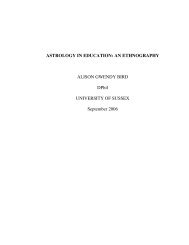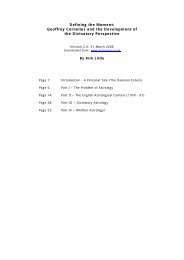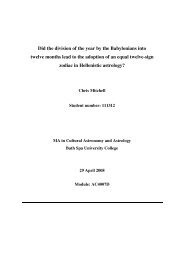Three Histories of Uranus - Astrology in the Year Zero
Three Histories of Uranus - Astrology in the Year Zero
Three Histories of Uranus - Astrology in the Year Zero
You also want an ePaper? Increase the reach of your titles
YUMPU automatically turns print PDFs into web optimized ePapers that Google loves.
<strong>Three</strong> <strong>Histories</strong> <strong>of</strong> <strong>Uranus</strong> Page 16<br />
“.. I was happy to surrender it (<strong>the</strong> comet) to <strong>the</strong> care <strong>of</strong> <strong>the</strong><br />
Astronomer Royal and o<strong>the</strong>rs, as soon as I found <strong>the</strong>y had begun<br />
<strong>the</strong>ir observations upon it.” 29<br />
His <strong>in</strong>terest <strong>the</strong>n appears to stop after he knows what is <strong>in</strong> a particular place<br />
<strong>in</strong> <strong>the</strong> heavens.<br />
The method <strong>of</strong> communication between astronomers <strong>in</strong> 1781 is ma<strong>in</strong>ly<br />
through letters. In Brita<strong>in</strong> <strong>the</strong> Penny Stamp had been <strong>in</strong>troduced <strong>in</strong> 1680<br />
and rema<strong>in</strong>ed until 1800, when it became more expensive, with a service<br />
that would be appreciated today, as letters were collected every hour. If one<br />
visits <strong>the</strong> Royal Astronomical Society today many <strong>of</strong> <strong>the</strong> orig<strong>in</strong>al letters<br />
between astronomers can be viewed, although due to <strong>the</strong> languages<br />
(sometimes German and French) and <strong>the</strong> handwrit<strong>in</strong>g <strong>the</strong>y are not<br />
particularly easy to follow but it is pla<strong>in</strong> that frequent communication took<br />
place concern<strong>in</strong>g <strong>the</strong> types <strong>of</strong> issues mentioned above <strong>in</strong> Herschel’s paper. It<br />
can already be seen what is be<strong>in</strong>g ‘entered’ <strong>in</strong>to <strong>the</strong> morphic field<br />
‘astronomer’; catalogues and facts and figures.<br />
Not long after <strong>the</strong> discovery <strong>of</strong> <strong>the</strong> ‘comet’, it became obvious that this was <strong>in</strong><br />
fact a planet. In 1781 <strong>the</strong> discoverer was given <strong>the</strong> honour <strong>of</strong> nam<strong>in</strong>g<br />
celestial bodies. Herschel does this <strong>in</strong> a letter <strong>in</strong> 1783 to Sir Joseph Banks<br />
who is President <strong>of</strong> <strong>the</strong> Royal Society 30 . It is worth quot<strong>in</strong>g most <strong>of</strong> this letter<br />
as not only does it give some feel for <strong>the</strong> times but it has significance for<br />
astrologers who f<strong>in</strong>d <strong>the</strong> name significant and it also shows <strong>the</strong> relationship<br />
that astronomers had with <strong>the</strong> monarchy.<br />
“By <strong>the</strong> observations <strong>of</strong> <strong>the</strong> most em<strong>in</strong>ent Astronomers <strong>in</strong> Europe it<br />
appears that <strong>the</strong> new star, which I had <strong>the</strong> honour <strong>of</strong> po<strong>in</strong>t<strong>in</strong>g out to<br />
<strong>the</strong>m <strong>in</strong> March, 1781, is a Primary Planet <strong>of</strong> our Solar System. A body<br />
so nearly related to us by its similar condition and situation, <strong>in</strong> <strong>the</strong><br />
unbounded expanse <strong>of</strong> <strong>the</strong> starry heavens, must <strong>of</strong>ten be <strong>the</strong> subject<br />
<strong>of</strong> <strong>the</strong> conversation, not only <strong>of</strong> astronomers, but <strong>of</strong> every lover <strong>of</strong><br />
science <strong>in</strong> general. This consideration <strong>the</strong>n makes it necessary to<br />
give it a name, whereby it may be dist<strong>in</strong>guished from <strong>the</strong> rest <strong>of</strong> <strong>the</strong><br />
planets and fixed stars.<br />
In <strong>the</strong> fabulous ages <strong>of</strong> ancient times <strong>the</strong> appellations <strong>of</strong><br />
Mercury, Venus, Mars, Jupiter and Saturn, were given to <strong>the</strong> Planets,<br />
as be<strong>in</strong>g <strong>the</strong> names <strong>of</strong> <strong>the</strong>ir pr<strong>in</strong>cipal heroes and div<strong>in</strong>ities. In <strong>the</strong><br />
present more philosophical æra, it would hardly be allowable to have<br />
recourse to <strong>the</strong> same method, and call on Juno, Pallas, Apollo, or<br />
M<strong>in</strong>erva, for a name to our new heavenly body. The first<br />
consideration <strong>in</strong> any particular event, or remarkable <strong>in</strong>cident, seems<br />
29<br />
Herschel, ‘The Scientific Papers <strong>of</strong> Sir William Herschel’, pp. 30-39, Communicated by<br />
Doctor Watson, Jun. <strong>of</strong> Bath – read April 26, 1781.<br />
30<br />
Herschel, ‘The Scientific Papers <strong>of</strong> Sir William Herschel’, pp.100-101.





